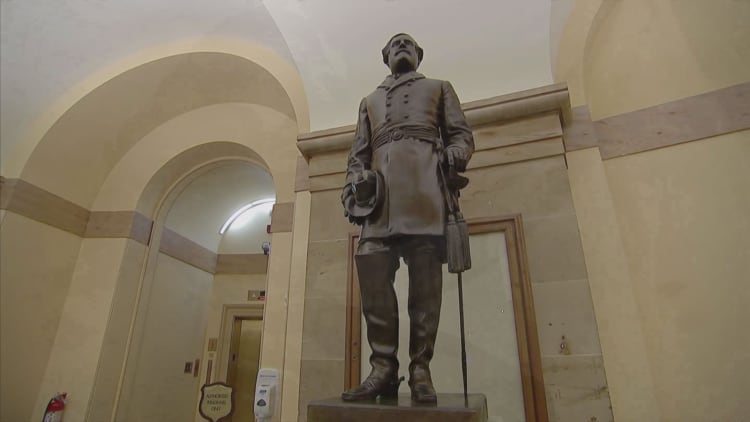President Donald Trump said Wednesday that U.S. Army bases named after generals who fought for slave-holding states of the Confederacy in the Civil War will not change their names.
"Our history as the Greatest Nation in the World will not be tampered with. Respect our Military!" Trump wrote in a tweet condemning the suggestion.
Trump's statement that "we will not even consider" changing the names came three days after a spokesman for the U.S. Army said, "The secretary of the Army is open to having a bipartisan conversation regarding the renaming" of 10 Army bases named after Confederate generals who had served in the U.S. Army, the nation's oldest service branch.

The Confederate states seceded from the United States in 1861 and fought a bloody, unsuccessful four-year war against the Union states in an effort to maintain the institution of using enslaved black men, women and children to perform labor.
A push to take the names of the Confederate general leaders off of U.S military bases has gained renewed force after the Memorial Day death of George Floyd, a black man, after a white Minneapolis police officer knelt on his neck for nearly nine minutes.
On Tuesday, retired Army Gen. David Petraeus, a former CIA director, wrote an article in The Atlantic calling for the removal of the Confederacy-linked names, which was topped by the words: "It is time to remove the names of traitors ... from our country's most important military installations."
Trump, in a multitweet post, rejected that idea, by contending that the Confederate names of the bases have become part of the nation's great "heritage."
"It has been suggested that we should rename as many as 10 of our Legendary Military Bases, such as Fort Bragg in North Carolina, Fort Hood in Texas, Fort Benning in Georgia, etc. These Monumental and very Powerful Bases have become part of a Great American Heritage, and a history of Winning, Victory, and Freedom," Trump wrote on Twitter.
"The United States of America trained and deployed our HEROES on these Hallowed Grounds, and won two World Wars. Therefore, my Administration will not even consider the renaming of these Magnificent and Fabled Military Installations," the president wrote.
The White House's Twitter account later posted a video from Trump's spokeswoman Kayleigh McEnany to reiterate his position.
McEnany also told reporters, "To suggest these forts are somehow inherently racist and their names need to be changed is a complete disrespect to the men and women, who, the last bit of American land they saw ... and lost their lives, were these forts.
On Tuesday, Chief of Naval Operations Adm. Mike Gilday said the Navy would bar the Confederate battle flag from being displayed in a variety of places.
"The order is meant to ensure unit cohesion, preserve good order and discipline, and uphold the Navy's core values of honor, courage and commitment," U.S. Navy Cmdr. Nate Christensen, spokesman for Gilday, the chief of Naval Operations, wrote in a statement Tuesday.
However, the Navy's USS John C. Stennis supercarrier is named after a U.S. senator from Mississippi who was a zealous supporter of racial segregation.
A Navy spokesman had no immediate comment when asked if renaming the Stennis is being considered.
The Marines earlier in the week ordered the removal of Confederate flags from that service branch's installations.
Trump's top economic advisor, Larry Kudlow, told reporters on Wednesday that "I don't believe nowadays we have systemic racism" in the United States.
But the NAACP, a leading civil rights group, has called for removal of all symbols of the Confederacy, including the names of military bases, which it notes have been defended by "Klansmen, neo-Nazis, and white nationalists ... as an innocent representation of their 'American Heritage.'"
"We know that these symbols glorify treason and a hateful history of white supremacy and black subjugation," the NAACP says on its website.
"In order for our country to move forward – to become a nation united and free from inequity and bigotry – we must remove Confederate symbols from the parks, schools, streets, counties, and military bases that define America's landscape and culture."
At The Pentagon, the Defense Department's massive headquarters, less obvious remnants of a racist history persist.
While the Pentagon was the first building in Virginia to be desegregated, its five-story, 34-acre compound was built years before with 284 bathrooms in order to keep white and black workers segregated.
Petraeus, in his Atlantic article, wrote, "When I was a cadet at West Point in the early 1970s, enthusiasm for [Confederate] Generals Robert E. Lee and Stonewall Jackson was widespread."
"We were not encouraged to think deeply about the cause for which they had fought, at least not in our military-history classes. And throughout my Army career, I likewise encountered enthusiastic adherents of various Confederate commanders, and a special veneration for Lee," Petraeus wrote.
He added that the U.S. Military Academy at West Point to this day "honors Robert E. Lee with a gate, a road, an entire housing area, and a barracks, the last of which was built during the 1960s."
"A portrait of Lee with an enslaved person adorns a wall of the cadet library, the counterpoint to a portrait of Grant, his Civil War nemesis, on a nearby wall."



